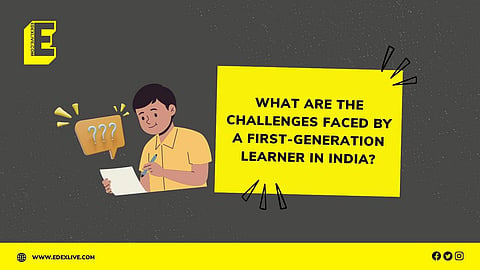

Do you know what it means to be a first-generation learner in your family? I don’t know and almost all of you readers shouldn't experience the pain and shame of this experience. But 13-year-Lokesh does, the only son of my house help Sulochna. Our house help has been with us since Lokesh was born and he is the only child in his family who has gone to school.
His mother narrates the milestones of her son with immense pride while we have our morning coffee – the filter brew, which force opens my senses to the day. I listen to Lokesh’s achievements and good performance in school and commend Sulochna and her husband Santhosh for bringing him up so well and making sure that he receives a quality education. Santhosh is an auto driver.
What challenges do first-generation learners have?
Both parents attend the parents' teachers' meetings and all functions at their son’s school. The other day Sulochana brought Lokesh’s marks card to show me and I saw that while the boy had done well in other subjects, he had not fared well in Math. She is unlettered but extremely intelligent, curious and quick to learn. I asked her to check with her son and his school if Lokesh needed help in the subject because it could get him better marks if he has a good teacher.
She returned the next morning and told me that her son had comforted her saying that he will do better the next time. In all this interaction I tried to understand what it means for a child to be surrounded by illiteracy and ignorance. How does he relate or convey to his parents his confusion regarding the myriad things that he goes through in his school in the process of learning? How do we encourage children in difficult circumstances to learn when there is no tangible motivation to do so?
The understanding that education will change his life for the better comes to him at a much later stage. Till then how do we motivate him to go to school? I had never come so close to this harsh reality that there are still lakhs of first learners in the country. I realised how important it is to frame policies around the first learners and families that battle poverty, violence, malnutrition and substance abuse to educate their children. What a task it is to make sure that no child remains out of school. Is it achievable? I’m sure it is though it may be a huge challenge because our state of education is without any economic assurance.
Does education mean employment?
A few days ago, the tipper to collect garbage was at our doorstep, when I stepped out and asked the driver, who doubles up as the collector of garbage, if he was educated. “If I was educated I would not have agreed to do this job. At least I am getting paid. I have friends, who are PU pass and looking for work. My mechanic, plumber and electrician friends make good money. They are not educated but skilled,” said Satheesh while digging his bare hands in the garbage to pile it atop the tipper. He was speaking the truth.
He and his friends didn’t attend school and are highly employable. How important is school education then? Will Lokesh remain unemployed as a postgraduate (PG)? All this fancy stuff of curriculum change, revision of syllabus, the worry over the escalating fee, attendance leads where? I was confused about what is ideal for our children. Education is a must, literacy is a must but not without the assurance of employment. Each child should be in school and come out of college as a skilled worker.
Education cannot thrive in silos. It has no value. Satheesh knows it best.
